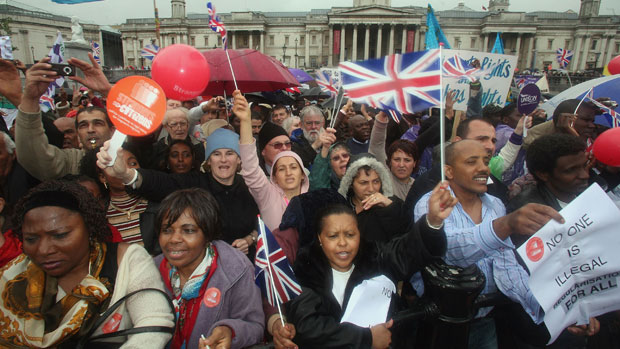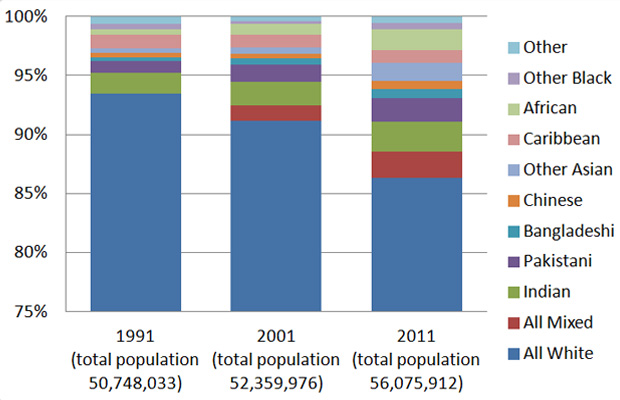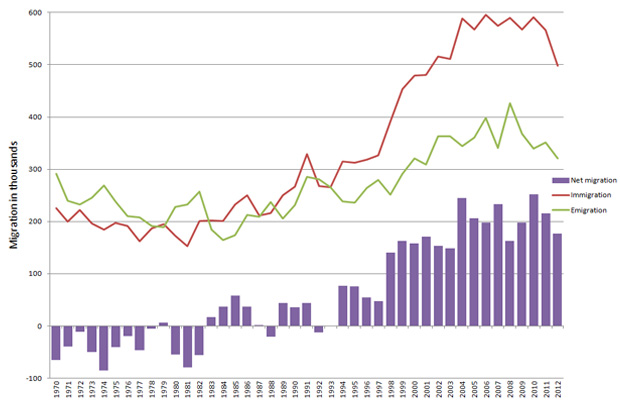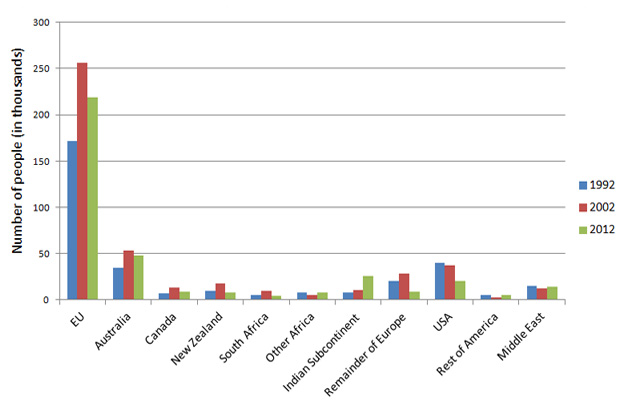UK immigration statistics: the data behind the headlines
How has the UK’s ethnic make-up changed and has immigration always been on the increase?

A free daily email with the biggest news stories of the day – and the best features from TheWeek.com
You are now subscribed
Your newsletter sign-up was successful
ETHNIC minorities are likely to make up a third of the population by the middle of the century, according to a report published today.
“The relative youth of the ethnic minority population, 20 years younger on average than white Britons, along with a higher birth rate, means that the population is likely to double from eight million people, or 14 per cent of the population, to about 30 per cent by the middle of the century,” The Times reports, quoting research from the Policy Exchange think tank.
The report assumes that net migration “will slow slightly but remain at about 165,000 a year”.
The Week
Escape your echo chamber. Get the facts behind the news, plus analysis from multiple perspectives.

Sign up for The Week's Free Newsletters
From our morning news briefing to a weekly Good News Newsletter, get the best of The Week delivered directly to your inbox.
From our morning news briefing to a weekly Good News Newsletter, get the best of The Week delivered directly to your inbox.
Migration is prominent in each of the main political parties’ manifestos and is likely to remain a hot topic in the lead-up to next year’s general election. Here are some of the statistics behind the headlines... How has the country’s ethnic make-up changed?England and Wales have become more ethnically diverse since 1991 when the Census first included a question about ethnicity. The total ethnic group population other than white has more than doubled in size from 1991, from three million (seven per cent) to almost eight million (14 per cent). The number of people describing themselves as white increased from 47.4 million in 1991 to 48.2 million in 2011 as the overall population has increased. However, the percentage of people describing themselves as white has decreased from around 94 per cent in 1991 to 86 per cent in 2011. The African ethnic group has grown faster than any other minority group in the last twenty years, doubling in each decade to reach 990,000 in 2011.

Has net migration always been on the increase?No. For much of the 1970s and 1980s the number of emigrants was often greater than the number of immigrants. It is over the last two decades that both immigration and emigration have increased to historically high levels, with immigration exceeding emigration by more than 100,000 in every year since 1998. This chart gives a guide to how net migration has increased over the years. However, the ONS has admitted that the numbers between 2001 and 2011 are hugely underestimated because of a failure to monitor many new arrivals at regional airports.

Where do people from the UK migrate to?Australia, the USA, Spain and France were among the top destinations for British citizens to emigrate to between 2000 and 2010. According to Home Office data, Australia was popular with younger age groups, while Spain and France were the top destinations for older age groups. Two in five British citizens who gave reasons for their emigration said they were going for a "definite job", around one in five said they were “looking for work” and another one in five were going to “accompany or join” someone else. Other reasons included formal study abroad.

A free daily email with the biggest news stories of the day – and the best features from TheWeek.com
-
 Local elections 2026: where are they and who is expected to win?
Local elections 2026: where are they and who is expected to win?The Explainer Labour is braced for heavy losses and U-turn on postponing some council elections hasn’t helped the party’s prospects
-
 6 of the world’s most accessible destinations
6 of the world’s most accessible destinationsThe Week Recommends Experience all of Berlin, Singapore and Sydney
-
 How the FCC’s ‘equal time’ rule works
How the FCC’s ‘equal time’ rule worksIn the Spotlight The law is at the heart of the Colbert-CBS conflict
-
 Local elections 2026: where are they and who is expected to win?
Local elections 2026: where are they and who is expected to win?The Explainer Labour is braced for heavy losses and U-turn on postponing some council elections hasn’t helped the party’s prospects
-
 How corrupt is the UK?
How corrupt is the UK?The Explainer Decline in standards ‘risks becoming a defining feature of our political culture’ as Britain falls to lowest ever score on global index
-
 The high street: Britain’s next political battleground?
The high street: Britain’s next political battleground?In the Spotlight Mass closure of shops and influx of organised crime are fuelling voter anger, and offer an opening for Reform UK
-
 Is a Reform-Tory pact becoming more likely?
Is a Reform-Tory pact becoming more likely?Today’s Big Question Nigel Farage’s party is ahead in the polls but still falls well short of a Commons majority, while Conservatives are still losing MPs to Reform
-
 Asylum hotels: everything you need to know
Asylum hotels: everything you need to knowThe Explainer Using hotels to house asylum seekers has proved extremely unpopular. Why, and what can the government do about it?
-
 Taking the low road: why the SNP is still standing strong
Taking the low road: why the SNP is still standing strongTalking Point Party is on track for a fifth consecutive victory in May’s Holyrood election, despite controversies and plummeting support
-
 What difference will the 'historic' UK-Germany treaty make?
What difference will the 'historic' UK-Germany treaty make?Today's Big Question Europe's two biggest economies sign first treaty since WWII, underscoring 'triangle alliance' with France amid growing Russian threat and US distance
-
 Is the G7 still relevant?
Is the G7 still relevant?Talking Point Donald Trump's early departure cast a shadow over this week's meeting of the world's major democracies